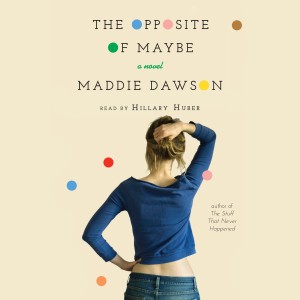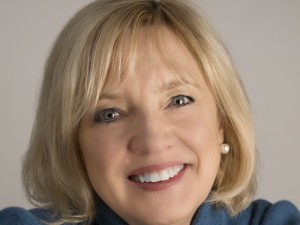The Opposite of Maybe
By Maddie Dawson, narrated by Hillary Huber
One of my first – and favorite – audiobooks that I selected for the Ideal catalog was The Opposite of Maybe, a warm, witty and thoroughly original story. Ideal had the pleasure of hosting author Maddie Dawson and narrator Hillary Huber in a conversation about their work and inspiration. – Amy Rubinate
Hillary: How does a story idea come to you? The whole story, or do you find your way?
Maddie: It’s such a strange process, really. You THINK you have the whole idea all intact and ready to go…and then as you’re writing, new things pop up and characters behave in ways that surprise you, and you might suddenly discover in the third draft that OH, THERE WAS A BROTHER, TOO! It’s very interesting. When I’m writing a novel, I feel as though I have one foot in that world and maybe three toes in my own world.
Hillary: I have an image of a authors in their offices with the walls covered in index cards, mapping everything out.
Maddie: I think that’s pretty accurate, and it’s so optimistic of us, too. But every now and then, the whole book feels like it can just take off in another direction. I have to stop about every 50 pages and ask myself, “So what is this thing really ABOUT?” Because it changes. You learn about the book as you go.
Hillary: That makes perfect sense to me. The characters unfold themselves and reveal facets that you probably didn’t realize were there!
Maddie: I’m so glad that you understand that. Sometimes I feel like I’m insane when I try to explain it to someone. But they really do start to feel like real people and just like when you meet a REAL person, you don’t learn everything about him or her all at once. It is gradual.
Hillary: Exactly. The same thing happens with narration the voices start out sort of half-baked, and midway through I could hold conversations with them all simultaneously with such ease!
Ideal: Can you share any pivotal moments that led you to do this work or told you that you were in the right place?
Maddie: Well…I think I always knew I wanted to be a writer. When I was six years old there is this family story about me. My mother wouldn’t give me money for the ice cream man, and it was a hot day, and I was mad about it, so I went in the house and wrote a story. Did illustrations, stapled it together, and then took it door-to-door until a neighbor bought it for 25 cents. Which was enough for TWO banana popsicles! I still remember thinking this could be a wonderful career for me, something that would always keep me in frozen desserts! But my poor mother was mortified, and went and bought the story back and told me I wasn’t allowed to peddle things to the neighbors anymore!
Ideal: Do you still buy yourself an ice cream when you finish a book?
Maddie: I should, shouldn’t I? Mostly, I need to eat ice cream while I’m writing it! I was also the kid who was always writing thingswhile other kids were out learning to hang by their knees on the swing sets, I was writing about twins and mixed-up families. I wrote a novel when I was 10, but had to quit when I lost track of all the characters. Turns out, creating a family with 7 children was too much to keep track of!
I think that writing was always for me something I felt like I HAD to do. I grew up in kind of a crazy family. My mother was later diagnosed with bi-polar illness, and she tended to be pretty volatile exciting and scary, both. So for me, writing was the place where I was safe, and where I could explore all the feelings that were going on around meand also the place where I could create the world as I wanted it to be. It didn’t feel like a choice as much as something I HAD to do.
Ideal: Hillary, were you driven in this way as a kid?
Hillary: I was the one hanging from the monkey bars…I was a ham and a performer from the get-go. My parents divorced when I was quite young and I spent half my time in Hawaii and half in Connecticut two very polar worlds. Adapting became my focus…
Maddie: Wow! That is quite a story two completely different worlds, I’m sure.
Hillary: Preppy East and Hippie-surfer Hawaii!
Ideal: Did one or the other feel like “you?”
Hillary: I actually feel pretty comfortable in both worlds now, but I probably struggled more with fitting in to the whole preppy boarding school deal. Hawaii just meant hanging out in a bathing suit all day!
Maddie: It’s amazing how resilient we can be, isn’t it? My parents also divorced when I was young, but my mother got custody and we didn’t see my father much. I spent a lot of my childhood trying to make things all right between them, and of course couldn’t do it.
Ideal: No wonder you’re both so good at handling complexity in your work! Hillary, do you think having to be so adaptable gave you the ability to do character work?
Hillary: I can’t imagine how it couldn’t… you become different characters when you encounter completely new experiences. I went to public school in Westport, Connecticut, Hawaii on vacations. Then in high school I was sent to boarding school whole new world. Summers were in Long Island with NYC kids. Adapt again. I’m actually a bit Sybil-like… 🙂
Ideal: That’s perfect for audiobook work! Maddie, do you bring this background into your work? Do you find yourself exploring these themes?
Maddie: I feel like I’m always exploring the themes of family and belonging in my work. I’ve written three other novels under my real name, Sandi Kahn Shelton, and when I look at all five of my novels, I can see that they have themes in common that I didn’t see when I was writing them! They’re all about crazy mothersor absent onesand the need to reconcile with the pastand often the realization that the people around us are often our truest families, more than the ones we were born into. It’s weird when you think you’re writing completely different stories, and yet the same kinds of things keep happening to my characters. I’d like to try a murder mystery or something!! But I can’t
Ideal: I think that theme came out so beautifully in The Opposite of Maybe. She took the family she thought she wanted, and ended up with a new one that was a true fit.
So how much of your characters (in each medium) do you bring in from real life?
Maddie: I think the characters who come to me are more ideas than real people I know. They take traits from people I recognize, but even if they start out based on someone real, they quickly take on their own personalities. It’s so weird to watch that happen.
Hillary: I definitely draw from real life, but mostly my character voices develop from clues within the text. I will often at some point realize they remind me of a celeb or someone I know, and at that point I will use that “cue” to keep them consistent. The same folks show up in book after book!!
Ideal: Maddie, you did an essay that mentioned how your characters came to you and insisted on being born. And then when you started writing, they bossed you around. Can you share a bit of that with our readers?
Maddie: Ha! It’s true. What usually happens to me is that a character will just show upand by that I mean she starts telling me her story. Usually in the middle of the night, waking me upor when I’m driving in the car, or doing something that makes it particularly difficult to write the story down. In the case of The Opposite of Maybe, the first thing I knew about Rosie was that she was pregnant and separated from her boyfriend/husband (she didn’t say which he was right away) and that she was falling in love with someone else. Over the next few weeks, I just kept hearing from her. She was insistent on telling me the story, and so I started making notes. It was intriguing to think of how that separation during a most important time (when you’re pregnant and going through so many changes) could wreck all their plans. Also, I was intrigued by the fact that Rosie had a story about herself that she believed whole-heartedly that she wasn’t good with kids, that she was clumsy and inept and probably unlovable and that none of that was true. So the journey she and I took together was really one of discovering who she really was, and whether or not she could cope with motherhood at age 44, and with leaving the man who may not be the best partner and taking a huge risk. And she WAS bossy!!
Ideal: I love this story! Hillary, do your characters talk to you? Do you find stealth favorites halfway through the book that you fall in love with? Do they whisper in your ear how they should be voiced?
Hillary: I don’t know if they whisper in my ear, but I do love how they reveal themselves and become more solid as the story develops. I tend to favor the ones with the most snarky attitude – Soapie, in this case! I pulled out my great aunt for her a perennial favorite. And I’m always happy when I can import one from another story and adapt them to a new story! Does that sound like cheating?
Ideal: Not at all! So many characters share similar traits, and might be friends if they managed to hop from book to book and hang out! Do you ever have problem characters that you just can’t get your mind around? How do you handle it? Do you try to wrangle them or just surrender?
Maddie: They all are problem characters at different times, I think. I feel as though I’m always listening so closely to the story they’re telling meand trying to get it exactly right. And sometimes it doesn’t go right and I have to sit down and rethink the whole point of the book. But yessome seem more problematic than others. I love it that you said you love the snarky characters, Hillary, because I do too. Soapie was so fun to write, because she was honest and said what she thought. But bringing Rosie to life, with all her vulnerabilities and her fear, was harder. I wanted her to be likable, for readers not to get impatient with her struggle to become herself.
Hillary: I really loved the struggle within Rosie, and I found myself struggling with what my choices would have been, which I think is excellent.
Maddie: I just got goosebumps hearing you talk about this! I cannot WAIT to hear Hillary reading this book. And Hillary, I’m so grateful to you for loving Rosie for her struggle. I want to write complex characters who really do have doubts and opinions
Hillary: It must be really weird and vulnerable to give up your words to someone else… Most of us narrators are here to be a conduit for your intentions. It is our job to get out of the way and let your characters sound and act and be like you wanted and imagined them…not always successful probably but that is what we strive for!
Ideal: Can you tell me a little about the struggles you might have? Writing and narrating are solitary activities. Do you ever feel like giving up? How do you find new inspiration when things get stale?
Maddie: I am a very social person, so the solitariness of writing really can get to me. I often have to trick myself into getting startedpretend I’m just going to write for a couple of minutes, just edit yesterday’s stuff but once I’m started, I’m usually hooked. And then it’s like that state of mind they call “flow” (on good days at least) where five hours passes and feels like five minutes. But there are the other days, the times when the words just won’t fall onto the page in the right order, and I feel miserable at the end of it. Like there’s so much more work to do to understand this story, and maybe it won’t ever come out right. And yes, I do resign from the writing profession fairly often, in fact. But I’m always dragged back to it. By the characters, by my own need to express myself, by time doing its magic in transforming the material. I’m always amazed at HOW LONG everything takes!
Hillary: I think the author’s struggles have to be MUCH greater than the narrator’s… you guys have to make this stuff up! We just have to take if off the page and bring it to life. I’m never surprised when I struggle recording a book that I don’t love; I just sort of grind along and invest myself to the best of my abilities in that case. But sometimes, I struggle recording a book I adore and that mystifies me. Is it lack of sleep? Too many hours in my “cell?” I’d rather be outside exercising or having happy hour with friends? I don’t know, but I do know when my performance is suffering, at which point I need to cut bait because I’m not doing anyone any favors at that point. I come back with a renewed attitude another time!
Maddie: It’s so true that keeping the thing feeling right is half the battle, isn’t it? I find that if I don’t feel like writing, I can sometimes trick myself into doing itbut there are also times when I’m not doing the book any favors by flogging it to death. Sometimes I have to wait and “hear” what’s next in the story, and it doesn’t do me a bit of good to force it.
Ideal: So what’s the best part? What’s the pinnacle for each of you?
Maddie: For me, it’s the work itself. Getting into the flow. Writing a sentence that feels legitimate and true can make me elated. Figuring out what is going to come next. Taking a walk and hearing my character tell me something I didn’t know before! I find that the post-publication part even when it’s good and includes praise and awards can’t compare to the act of writing and creating something, making a whole world out of nothing.
Hillary: The best for me is when I realize I’ve narrated ten pages and wasn’t aware of turning even one! That doesn’t mean I don’t make mistakes. The pinnacle is praise from the author that I have fulfilled their vision!
Ideal: What message would you like to give to someone who might be striving to do the work you both do so well?
Maddie: I teach writing workshops, and I’m always telling my students that the struggle is the whole processit’s not going to be easy, but you can’t give up on the work. We all want to write final drafts first, and it just ain’t happening. You have to come to the story so delicately and let it reveal itself to you, and then gently revise and refresh and renew it, over and over again, always asking yourself what it’s really about. Because that changes. You learn the story only by getting to the end of it. But it’s exhilarating and exciting when it works, and there’s nothing more fun!
Ideal: Beautiful!
Maddie: I want to thank you so much for inviting me to this conversation. It was wonderful to talk about the work we both share, bringing a book to life. And Hillary, I can’t wait to hear your narration of my book. I’m so excited and deeply indebted to you for your sensitivity about the work. And Amy, you are extraordinary in your commitment to bringing books to life! Thank you both so much! I’ve learned a lot!!
Hillary: Amy has created such a beautiful brand. I am honored to have been chosen by her to wrangle your words! It really is such a collaborative process I like to speak to authors prior to recording when I can, but sometimes, when the book is well written and the characters are clearly delineated, such as in The Opposite of Maybe, I just let your work do my work for me, if that makes sense! You’ve done the hard part already. I’ve just gotta let it flow! A delight. Truly!
Ideal: Thanks so much for joining me today. It was such a pleasure to talk with both of you! I can’t wait to share your wonderful ideas with the world.
Click here for more information on The Opposite of Maybe.








